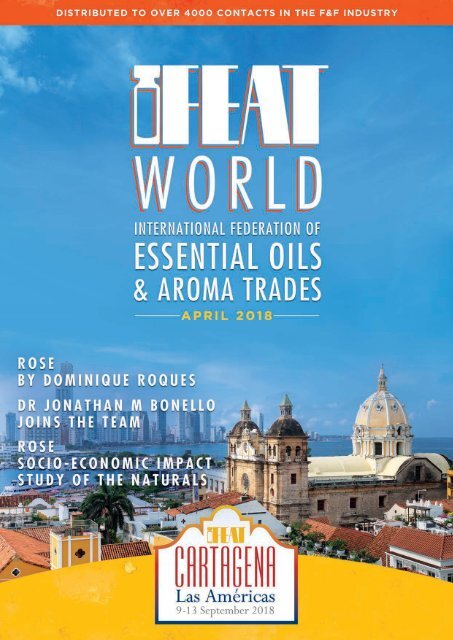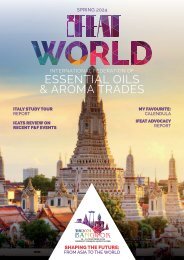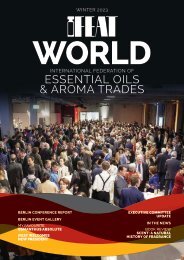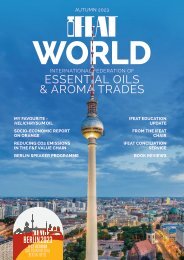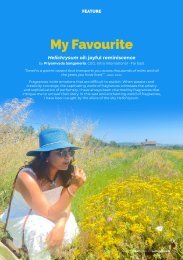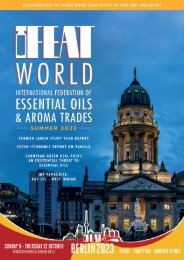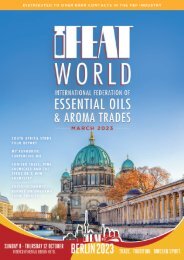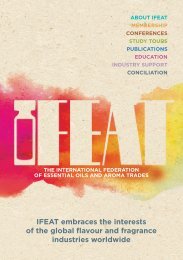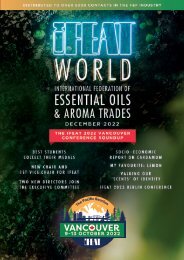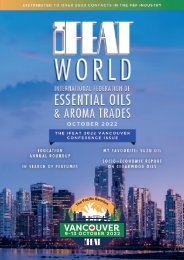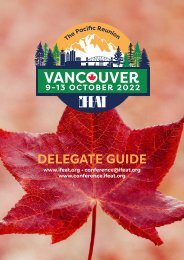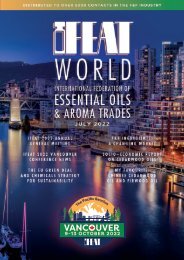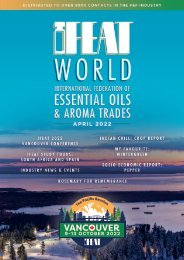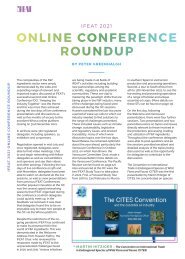You also want an ePaper? Increase the reach of your titles
YUMPU automatically turns print PDFs into web optimized ePapers that Google loves.
WORLD 3<br />
FROM THE CONFERENCE CHAIRMAN<br />
RAÚL AMIGO<br />
manufacturer<br />
of the highest quality:<br />
Natural<br />
Aroma Chemicals<br />
from Essential Oils<br />
Aroma Chemicals<br />
Organic Essential<br />
Oils and Distillates<br />
“I look forward to welcoming you all to<br />
our <strong>2018</strong> IFEAT Conference taking place<br />
in Cartagena, Colombia, from 9th to<br />
13th September. After 17 years, the IFEAT<br />
Conference is finally returning to South<br />
America!<br />
Cartagena, overlooking the<br />
Caribbean Sea, is the top tourist<br />
destination in Colombia, with a<br />
charming historic walled city that<br />
provides a fascinating insight<br />
into the city’s past, and due to its<br />
historical heritage, UNESCO<br />
declared the city a “World<br />
Heritage Site” in 1984. This<br />
is all within a five minute<br />
taxi journey from the<br />
Conference hotels.<br />
The Conference will be held at the Estelar<br />
Cartagena de Indias Hotel & Convention<br />
Center and the Hyatt Regency Hotel,<br />
adjacent properties in the Bocagrande<br />
area of Cartagena and located just 10<br />
minutes by taxi from the airport.<br />
The theme for the <strong>2018</strong> Conference<br />
is “Las Américas” and it will focus on<br />
essential oils and F&F markets in Central<br />
and South America, the Caribbean,<br />
Mexico and the Amazon. It will also<br />
cover legislative and scientific issues. We<br />
have an interesting and varied speaker<br />
programme and there is more information<br />
on speakers who have already confirmed<br />
in this edition of <strong>IFEATWORLD</strong>. As more<br />
speakers confirm, information will be<br />
updated on the website.<br />
The Conference programme will be similar<br />
to the past two years, running for two<br />
full days of plenary sessions on Monday<br />
and Tuesday whilst on Wednesday and<br />
Thursday, we will have the IFEAT Trade<br />
Exhibition, where delegates will have<br />
the opportunity to meet international<br />
companies from within the industry. I<br />
encourage companies to make their<br />
Exhibition Booth bookings as early as<br />
possible to avoid disappointment!<br />
Short courses and a workshop on<br />
distillation processes are being organised<br />
for the Wednesday and Thursday and more<br />
information about these will be available<br />
on the website when they are finalised.<br />
Registration for the Cartagena conference<br />
opened on 19th <strong>Apr</strong>il for members and<br />
opens on 1st May for non-members. Book<br />
early to take advantage of the “early bird”<br />
rates.<br />
I would like to thank my colleagues on<br />
the IFEAT Cartagena Committee for their<br />
great support assisting me to organise this<br />
exciting Conference, as well as the Local<br />
Organising Committee; Aldemar Castaño,<br />
Germán Ronderos and Andres Tolosa.<br />
A big thanks also to the Events & Co team<br />
and to our IFEAT team: Louise, Ronit,<br />
Sarah & Tina.<br />
Bienvenidos a Cartagena!”<br />
Raúl Amigo<br />
Chairman, IFEAT <strong>2018</strong> Cartagena<br />
Conference Committee.<br />
For editorial and advertisement enquiries,<br />
please email the editor, Tina Carne, at:<br />
ifeatworld@ifeat.org<br />
www.citrusandallied.com<br />
info@citrusandallied.com<br />
410-273-9500
4<br />
WORLD<br />
WORLD 5<br />
MY FAVOURITE • ROSE • BY DOMINIQUE ROQUES<br />
There is no clear reason why Rosa<br />
damascena, the Queen of flowers in<br />
Perfumery, bears the origin of Damascus<br />
in its name but it likely traces back to the<br />
Crusades era with fighters and merchants<br />
smelling and trading<br />
rose seedlings and<br />
primitive oils in the<br />
largest city of the<br />
Middle East, before<br />
they carried it on the east and westward<br />
bound roads.<br />
What we do know is that Rosa<br />
damascena originates from Persia and<br />
more precisely from the province of<br />
Shiraz where, still today, there are hills<br />
where roses grow wild and form amazing<br />
scenery when they start blooming in<br />
<strong>Apr</strong>il or May.<br />
Of Persian origin like so many familiar<br />
trees - like cypress or apricot - our rose<br />
has travelled. To far and strange places...<br />
ROSE<br />
BY DOMINIQUE ROQUES<br />
“Until the 18th century, rose<br />
was used and praised in<br />
the form of “rose-water.”<br />
MY FAVOURITE<br />
This journey takes us to the plateau of Taëf<br />
in Saudi Arabia, an amazing site almost<br />
2,000 m above sea level where the Royal<br />
family claims to be distilling the most<br />
precious rose oil in the world.<br />
And it’s a long way,<br />
reaching almost the<br />
Atlantic Ocean in southern<br />
Morocco, in the valleys of<br />
the rivers Dadès and M’Goun where, out of<br />
nowhere, kilometres of rose hedges circle<br />
small fields of wheat or vegetables in the<br />
majestic beauty of the decaying ksars,<br />
those clay castles slowly melting down<br />
with time.<br />
But it is around the 17th century that<br />
Rosa damascena found a home for<br />
good in what was then the Edirne<br />
province, in the location the Sultan’s<br />
gardeners recommended as the most<br />
favourable for growing the fragrant<br />
rose. This was to become what is today<br />
the Valley of Roses in Bulgaria, centred<br />
on the town of Kazanlak.<br />
Until the 18th century, rose was used<br />
and praised in the form of “rose-water”,<br />
widely used in all Islamic cultures, as it is<br />
today still strikingly used in Iran, Turkey or<br />
Morocco.<br />
Then the Bulgarians really “invented” the<br />
distillation of the flower and the recovery<br />
of the oil and organised its trade. Rose oil<br />
became a symbol and a most important<br />
ingredient of modern perfumery was<br />
born. Bulgarians are still<br />
very proud today of this<br />
three century glorious<br />
journey, even if they<br />
now have to share with<br />
Turkey what used to be a monopoly.<br />
It is simply wonderful to walk the rose<br />
fields of the valley in the early morning<br />
from Karlovo to Tarnichene or Zimnitsa.<br />
The fields are fragrant with the breeze,<br />
flowers starting to “distillate” in the sun,<br />
about to be picked. The smell is both<br />
delicate and enrapturing.<br />
ROSA DAMASCENA<br />
“This is not birds singing, this<br />
is the soul of the fallen soldiers<br />
singing for their brides.”<br />
Follow the horse carts loaded with 15 kg<br />
pink bags into the distilleries where the<br />
smell of distillation goes straight to your<br />
brain.<br />
One million hand-picked flowers for a litre<br />
of precious oil. Watch the distillate coming<br />
out of the copper or steel vessels and the<br />
decanting oil floating on top of the water<br />
with its deep golden colour with shades of<br />
green.<br />
And take the time to visit<br />
the church of Shipka at<br />
the heart of the Valley<br />
of Roses. A celebration<br />
of the 1878 victory over the Ottomans,<br />
the church with its golden domes rising<br />
from the surrounding forest overlooks<br />
the country where the last battle for<br />
independence took place.<br />
In the valley below, rose fields were<br />
planted 20 years ago and I remember<br />
walking there one morning and listening to<br />
LOADING FOR<br />
DISTILLATION<br />
India<br />
the enchanting song of the birds getting<br />
stronger as the sun was rising.<br />
Asking the man who planted the field<br />
about the birds, he said to me: “This is not<br />
birds singing, this is the soul of the fallen<br />
soldiers singing for their brides.”<br />
I TELL YOU,<br />
ROSE IS<br />
A MAGIC<br />
JOURNEY!<br />
GEORGIA<br />
East of the Black Sea<br />
MY FAVOURITE • ROSE • BY DOMINIQUE ROQUES<br />
Travelling east along the silk roads, it has<br />
reached China where it is established<br />
today in Yunnan and central China, but<br />
the delicate pink fragrant flower is also<br />
largely spread in Iran and has left traces<br />
in Kyrgyzstan and Pakistan.<br />
And of course, it has settled long ago in<br />
India where it became as important as<br />
sandalwood for the Attars of the city of<br />
Kannauj, meeting point of three empires<br />
in current Uttar Pradesh.<br />
Probably much later on, Rosa damascena<br />
moved south and west where it was to<br />
meet fame and glory with the Ottoman<br />
empire gardeners.<br />
ROSE PICKERS<br />
Shipka, Bulgaria
6<br />
WORLD<br />
WORLD 7<br />
DR JONATHAN M BONELLO JOINS THE IFEAT TEAM<br />
DR JONATHAN<br />
M BONELLO<br />
JOINS THE<br />
IFEAT TEAM<br />
NEW WEBSITE<br />
Jonathan joined the IFEAT team as<br />
a Consultant in January <strong>2018</strong> in the<br />
role of Scientific Coordinator. He is an<br />
accomplished professional with over<br />
15 years’ experience in the flavour and<br />
fragrance industry having held various<br />
senior management roles in strategic<br />
sourcing of raw materials (synthetic and<br />
natural aroma chemicals, intermediates<br />
and essential oils), supply chain and the<br />
implementation of modern procurement<br />
systems and processes at both Firmenich<br />
and Givaudan. Within these roles he<br />
actively contributed to projects linked<br />
to sustainability, ethical sourcing,<br />
REACH and other evolving regulatory<br />
standards. More recently Jonathan held<br />
the position of Head of Global Innovation<br />
Procurement at Givaudan, driving crossfunctional<br />
strategies and initiatives to<br />
build best-in-class manufacturing and<br />
supply solutions for natural and synthetic<br />
flavour and fragrance ingredients,<br />
integrating technology platforms,<br />
open innovation programmes and<br />
strategic alliances and partnerships. In<br />
September 2017, he founded a freelance<br />
consultancy company based in Geneva,<br />
Switzerland that specialises in the area<br />
of natural products and ingredients as<br />
well as novel technologies like biotransformations.<br />
FOR THE CARTAGENA CONFERENCE<br />
This year, we have built a new website<br />
specifically for the IFEAT <strong>2018</strong> Cartagena<br />
Conference, making registration even<br />
easier. A link to the new website is<br />
provided on www.ifeat.org which<br />
takes you to an online shop where you<br />
can buy everything available at the<br />
Conference. As well as being able to<br />
register as a delegate, you can book<br />
an exhibition booth or meeting room<br />
and buy sponsorship or advertising<br />
from the large number of packages<br />
on offer this year. You can also book<br />
your hotel room direct via links on the<br />
website. Members who log in can take<br />
advantage of special discounted rates.<br />
Jonathan has received several awards<br />
in recognition of his academic merit and<br />
achievements, completing his education<br />
with a PhD in physical chemistry from<br />
Cambridge University in 2001. He is the<br />
author of several publications in peer<br />
reviewed journals and a Member of<br />
the Royal Society of Chemistry and the<br />
American Chemical Society.<br />
As Scientific Coordinator, Jonathan will<br />
report to, and work closely with, the<br />
Chair and Members of the IFEAT Scientific<br />
Committee, in discerning and managing the<br />
best approach to issues and opportunities<br />
affecting the production and use of<br />
essential oils and related materials. Other<br />
responsibilities will include the set-up and<br />
management of specific scientific projects,<br />
information as well as education letters and<br />
other activities such as addressing concerns<br />
related to new regulatory and socioeconomic<br />
challenges facing the industry.<br />
Finally, Jonathan will support IFEAT in<br />
enhancing its strong relationships with sister<br />
organisations under the direction of the<br />
Scientific and Executive Committees.<br />
A Maltese and Swiss dual national fluent<br />
in several languages, Jonathan enjoys<br />
reading, theatre, music and historical and<br />
cultural travel. He is also keen on running,<br />
swimming and hiking.<br />
CALL FOR PAPERS<br />
We had a very good response to the Call<br />
for Papers this year and, as a result, the<br />
speaker programme for Cartagena is<br />
almost finalised. A big thank you to all who<br />
submitted a paper for consideration. We<br />
had some very interesting submissions!<br />
The full conference programme is being<br />
finalised and will soon be updated on<br />
the Cartagena website. This year we<br />
have papers covering citrus, including<br />
economic changes in the lemon industry<br />
in Argentina, as well as the challenges<br />
within the industry with a focus on citrus<br />
greening.<br />
There will be an overview of the F&F and<br />
essential oils industry in Colombia and<br />
the broader Latin American region. Juan<br />
Elizalde will take us on a journey through<br />
the culinary senses of South America<br />
whilst Luis Alberto Asturias will look at<br />
production of natural essential oils in<br />
Guatemala, El Salvador and Honduras.<br />
Further sessions will look at the<br />
opportunities that exist in Colombia<br />
and Latin America for essential oil<br />
production. Robin Van Loon will discuss<br />
the opportunities that aromatic essential<br />
CARTAGENA<br />
CONFERENCE PROGRAMME<br />
oils provide as a driver for rainforest<br />
conservation and regeneration and<br />
Iguatemi Costa will show how Natura<br />
is seizing the opportunities to produce<br />
new essential oils from the forest. Patricia<br />
Shimojo will look at the fragrance market<br />
in Brazil.<br />
Regulatory landscapes will also be<br />
examined with Richard Pisano Jr showing<br />
the history of flavour safety evaluation.<br />
His lecture will be an introduction to the<br />
90-minute workshop which he will run<br />
later in the programme. The workshop<br />
will begin with an understanding of the<br />
global process for flavour ingredient<br />
safety evaluation, including a very<br />
entertaining history lesson going back<br />
to 1958. Participants will see how the<br />
GRAS process in the US morphed into<br />
the JECFA process and samples will be<br />
looked at as well as slides of essential<br />
oil production. At the conclusion, each<br />
attendee will be able to present the same<br />
lecture and it is hoped they will return to<br />
their companies and train associates to<br />
do just that.<br />
There will be the usual business session<br />
with the AGM, a round-up of the<br />
education programmes at Plymouth<br />
and Reading Universities, presentations<br />
on next year’s Conference and Study Tour<br />
destinations as well as best student<br />
medal presentations.<br />
A number of panel discussions are<br />
being organised and, once finalised,<br />
information about these will be added<br />
to the programme on the Cartagena<br />
website.<br />
We encourage you to keep some space<br />
in your busy diaries to attend some of<br />
these very interesting plenary sessions.<br />
CONFIRMED SPEAKERS TO DATE:<br />
RICHARD C PISANO JR<br />
President, Citrus and Allied Essences Ltd<br />
DR JUAN ELIZALDE<br />
R&D Manager, Cramer<br />
ROBIN VAN LOON<br />
Founder & Executive Director, Camino Verde<br />
PATRICIA SHIMOJO<br />
Marketing Professional, Vollmens Fragrances Ltda<br />
CARTAGENA • CONFERENCE PROGRAMME<br />
Due to this success, we will be issuing<br />
a Call for Papers again for next year’s<br />
conference and this will be announced at<br />
the Cartagena Conference. If you would<br />
like to be considered to present a paper at<br />
any of our forthcoming conferences, please<br />
email an abstract (approx. 200 words) a<br />
head and shoulders photograph (in high<br />
resolution) along with a brief biography<br />
to Tina Carne, (IFEAT’S Conference<br />
Programme Coordinator and <strong>IFEATWORLD</strong><br />
Editor) to tina.carne@ifeat.org<br />
IGUATEMI COSTA<br />
Senior Scientific Manager, Natura<br />
LUIS ASTURIAS<br />
Founder partner of Aromas Naturales, S.A.
8<br />
WORLD<br />
WORLD 9<br />
SOCIO-ECONOMIC<br />
IMPACT STUDY OF THE NATURALS<br />
ROSE<br />
THIS REPORT IS PART OF A SERIES OF REPORTS BEING PRODUCED BY<br />
THE IFEAT SOCIO-ECONOMIC SUB-COMMITTEE ON THE IMPORTANCE<br />
OF SPECIFIC NATURALS TO THE LIVELIHOODS OF THOSE INVOLVED<br />
IN THEIR PRODUCTION.<br />
SOCIO-ECONOMIC IMPACT STUDY OF THE NATURALS • ROSE<br />
INTRODUCTION<br />
There are four major species of rose plants which are<br />
cultivated for industrial applications:<br />
Rosa Damascena Miller • Rosa Centifolia •<br />
the lesser white coloured Rosa Alba • Rose Rugosa.<br />
Today, we can locate production in Iran, Afghanistan, China,<br />
Bulgaria, Turkey, Morocco and India. In Morocco, Centifolia is<br />
the variety that is mainly cultivated, while in China the Rugosa<br />
variety yields a very different quality than the more significant<br />
damascena oil upon which this report will focus.<br />
In essence, this report will impart no new knowledge about<br />
the various productions around the world but will compile and<br />
summarise the excellent work by Peter Greenhalgh, Hasan Ali<br />
Kinaci, Liat Murad Barbut, F. H. Giryel, M. C. Omerci Kartin,<br />
Juliana Ognyanova and Primrose Wilson. Others will also be<br />
noted in the bibliography.<br />
The figures on each of these regions are at best tenuous<br />
approximations. The two most significant regions for Rosa<br />
damascena continue in their historical centres: Turkey, primarily<br />
in the region surrounding the city of Isparta in the southwest part<br />
of the country, and the Valley of Roses centred around the Stara<br />
Zagora and the Plovdiv areas of Bulgaria. In both regions we<br />
have the Ottomans (who controlled these regions until Bulgaria’s<br />
independence in March of 1878) to thank for the impetus for<br />
planting and production.<br />
TURKEY<br />
Although roses, per se, and rose oil have for centuries figured<br />
prominently in Anatolian culture, the first commercial rose oil<br />
distillery plant was commissioned only in 1934/1935. “Rose<br />
oil production is a really tough and labour-intensive activity<br />
carried out by family farms without high-income expectation.<br />
Although because of all these challenges, rose oil production<br />
still exists because it is a traditional local product and a part of<br />
cultural heritage, and provides a certain income to its producers,”<br />
Givag and Kant clearly state in their 2010 report 1 . At that time,<br />
there were some 10,000 families involved in the production of<br />
ca.1,400 kg of oil. Most rose flower production comes from<br />
smallish family plots of less than a hectare which supply numerous<br />
distillation facilities 2 . One would say that in the past eight years<br />
the production has increased in conjunction with demand and<br />
significantly higher prices.<br />
The six major distillers who produce +/- 65% of Turkey’s oil are<br />
Sebat United, Gulbirlik, Robertet, IFF, Ercetin and Biolandes.<br />
Between eight and ten other companies comprise the balance.<br />
Each year some 7,000-8,000 MT of roses are converted to<br />
oil (1,400 kg) and rose concrete, and subsequently absolute<br />
(6,000 kg and 1,000 kg respectively in 2013) 3 . Based on 2017<br />
numbers one can extrapolate the value of this business to be<br />
approximately:<br />
1,400 kg oil @ $11,000.00 kg = $15,400,000<br />
10,000 kg concrete @ $1,364.00 kg = $13,640,000<br />
5,000 kg absolute @ $322.00 kg = $16,125,000<br />
Total: $45,165,000<br />
This is supporting 10,000 families, that is, +/- 45,000-50,000<br />
people plus more than 15 factories and countless exporters 4 .<br />
BULGARIA<br />
Similarly to Turkey, rose growing dates back to the Ottomans<br />
who built upon an existing culture of over 350 years; it can<br />
be assumed that the rose plants were brought to Europe by<br />
returning Crusaders from Persia. With the collapse of the<br />
communist system in +/- 1992 the government centralised<br />
Bulgarska Rosa organisation splintered into numerous privately<br />
held companies. There is some concern that the quality/yields<br />
may have deteriorated since this time; the state-run organisations<br />
closely controlled the nursery feed-stock and all aspects of<br />
production which resulted in a consistent quality from all of the<br />
growing regions. There is adequate evidence suggesting that<br />
this consistency has been compromised. That there has been the<br />
recent introduction of Rose Centifolia into Bulgaria, corroborates<br />
this disturbing fact.<br />
Although there is a trend to larger rose plantations by several<br />
of the more significant distillers, more than 7,000 families in<br />
the mountainous and semi-mountainous areas - most of them<br />
coming from minority population groups - earn their income<br />
from essential oil plant cultivation. However, there has been an<br />
ever-increasing shortage of labour during the harvesting period,<br />
in part due to migration. Estimates are that there are more than<br />
12,000 people who work in the rose industry year-round, while<br />
during harvest time in May to mid-June, weather depending,<br />
these numbers swell to some 40,000 pickers, harvesting around<br />
3,500 to 4,000 hectares of rose plantations 5 . Since Bulgaria’s<br />
entrance into the EU in 2007, new wage structures have put<br />
considerable stress on production costs. The availability of lowcost<br />
Romany labour cannot be overstated in mitigating more<br />
dramatic future price increases.<br />
Using very loose approximations for 2017, we would<br />
guestimate production to have been based upon a harvest of<br />
11,000/12,000 MT of flowers:<br />
+/- 2,400 kg oil @ $11,000 kg = $26,400,000<br />
+/- 2,000 kg concrete @ $1,600 kg = $3,200,000<br />
200 kg absolute @ $3,000 kg = $600,000<br />
Total: $30,200,000<br />
PRODUCTION IN OTHER COUNTRIES<br />
Historically, Iran may be one of the first producers of rose oil,<br />
though rose water is their signature product. This precious rose<br />
water, so culturally important to this country, was first produced<br />
by the Persian physician, Avicennia, in the 10th century. Damask<br />
Rose is commonly called the Flower of the Prophet Mohammed<br />
figuring prominently in holy as well as medicinal contexts.<br />
It is reported that some 13,000-15,000 hectares are tended<br />
by some 500 farmers (this number seems too few perhaps); the<br />
numbers are not available as to how many people are involved<br />
with the actual harvest and production. As in Bulgaria and<br />
Turkey, these farms are generally small land holdings centred<br />
around the major producing areas of Kashan, Keman, Shirz and<br />
Kerminshah. The production of oil may be only 200 kg annually<br />
but the production of rose water is massive, +/- 75/85 m litres 6 .<br />
Significant inflation resulting from economic sanctions has<br />
already affected price and production, though most of their crop<br />
is consumed internally rather than exported.<br />
Morocco is an important producer of predominantly Rose<br />
Centifolia. Annual production is approximately 2,000 MT of<br />
flowers employing 6,000 small farmers. In 2017 rose petal prices<br />
were +/- US$ 1.80 kg with the women pickers being paid $0.40<br />
per kg for their labour 7 . Their major production is of concrete,<br />
rather than oil.<br />
Rose cultivation in China dates to the 13th century with<br />
Mongolians of the Yuan Dynasty and then French missionaries<br />
in the 18th century. Production today is primarily in the higher<br />
altitudes of Yunnan Province. It is perhaps, in the past 12-15<br />
years that commercialisation of their production has been<br />
organised. Rose oil and important quantities of rose water are<br />
produced for the cosmetic industry. Production in 2017 has been<br />
estimated at +/- 700-800 kg of Centifolia oil 8 .<br />
SOCIO-ECONOMIC IMPACT STUDY OF THE NATURALS • ROSE
10<br />
WORLD<br />
SOCIO-ECONOMIC IMPACT STUDY OF THE NATURALS • ROSE<br />
The IFEAT Study Tour in 2014 visited the Yunnan Heng Feng Rose<br />
Perfumery Company which has been mainly working with the<br />
Rugosa variety; however, in the past five years there have been<br />
plantings of Rosa Rugosa with promises of increases to come.<br />
The oil which we have seen from China does not yet compare<br />
favourably with Bulgarian or Turkish oil. Give them time. Figures<br />
on people involved and costs are not available.<br />
India also produces rose products. It has been suggested that rose<br />
production dates to the 16th century during the Mughal Empire.<br />
Today ca 2,500-3,000 hectares of Rosa damascena are under<br />
cultivation from which +/- 200 kg of oil and larger quantities<br />
of rose water are produced. The oil compares favourably in<br />
composition to Bulgarian oil 9 .<br />
Country<br />
Rose Variety<br />
Area Devoted<br />
to Production<br />
Essential Oil Produced<br />
(Metric Tons)<br />
Work Force<br />
The most interesting new production is happening in Afghanistan<br />
since about 2010 when German economic and a German NGO,<br />
German Agro Action interests, and U.S. aid programmes began<br />
funding the project. The aim was to employ similar farming<br />
techniques on plants to replace the production of poppies/heroin.<br />
There are perhaps as much as 3,000 hectares planted; some<br />
certainly with materials supplied from Bulgaria. The equipment<br />
is alleged to have been supplied by Turkish producers for two or<br />
three distillation facilities. As much as 100-120 kg of oil is likely<br />
finding its way to Europe 10 . Dated information suggests that more<br />
than 400 farmers are involved in the dangerous area of eastern<br />
Afghanistan.<br />
Rose oil, rose concrete/absolute and rose water are used in a<br />
wide variety of consumer products. Cosmetics, perfumes, food<br />
flavouring, religious incantations and aromatherapy are a few<br />
using this “Queen of Oils”. Many thousands are involved in<br />
its manufacture while millions enjoy its splendour. And, it is of<br />
significant economic importance to these producing areas and<br />
their populations.<br />
BIBLIOGRAPHY<br />
1<br />
Giray, F H, and C Omerci Kart. “Economics of Rosa damascena in<br />
Isparta, Turkey.” Bulgarian Journal of Agricultural Science, vol. 18,<br />
no. 5, pp. 658–667. 2012.<br />
2<br />
Kinaci, Hasan Ali. (2010, September). Essential Oils of Turkey: Cultivation,<br />
Industry, and Trade. Paper presented at the IFEAT International Conference,<br />
Marrakech, Morocco. Conference Proceedings, pp. 105–117.<br />
3<br />
Barbut, Liat Murat. (2014, September). An Overview of the Essential Oils<br />
Industry in Turkey. Paper presented at the IFEAT International Conference,<br />
Rome, Italy. Conference Proceedings, pp. 147-155.<br />
4<br />
Ibrahim Isidan (personal communication, May 10, 2017)<br />
5<br />
Peter Greenhalgh (personal communication, August 30, 2017)<br />
6<br />
Primrose Wilson (personal communication, <strong>Apr</strong>il 28, 2017)<br />
7<br />
Jalal Charaf (personal communication, <strong>Apr</strong>il 27, 2017)<br />
8<br />
Peter Greenhalgh (personal communication, June 26, 2017)<br />
9<br />
Shawl, A.S. and Robert Adams (2009, July) Rose Oil in Kashmiri India.<br />
Perfumer & Flavorist, 34, 22-25.<br />
10 Dominique Roques (personal communication, May 8, 2017)<br />
2017 Petal Price /<br />
Oil Price per kg<br />
Concrete Produced<br />
(Metric Tons)<br />
Rose Water Produced<br />
(Metric Tons)<br />
Bulgaria<br />
Turkey<br />
Morocco<br />
Iran<br />
China<br />
China<br />
Afghanistan<br />
India<br />
Damascena<br />
Damascena<br />
Centifolia<br />
Damascena<br />
Rugosa<br />
Damascena<br />
Damascena<br />
-<br />
4000 ha<br />
2000 ha<br />
-<br />
13000-15000 ha<br />
-<br />
-<br />
3000 ha<br />
2500-3000 ha<br />
1 - Based on 7000-8000 metric tons of petals<br />
2 - Based on 40-45 metric tons of petals<br />
3 - Bulgarian Lev<br />
4 - Moroccan Dirham<br />
1.5-2.4 MT<br />
1.4 MT¹<br />
2000 MT Petals<br />
.2 MT 2<br />
.7-.8 MT<br />
-<br />
.1-.15 MT<br />
.2 MT<br />
35000 Pickers<br />
10000 Families<br />
6000 Farmers<br />
500 Farmers<br />
-<br />
-<br />
400 Farmers<br />
-<br />
2.20Лᴃ 3 / $11000<br />
7.50Kr /<br />
1.80 MAD 4 /<br />
-<br />
/ $8750<br />
/ $10000<br />
-<br />
-<br />
c. 2 MT<br />
10 MT @ $1364<br />
6-6.5 MT<br />
.075-.085 MT<br />
-<br />
-<br />
-<br />
-<br />
300 MT<br />
> 80 MT<br />
-<br />
-<br />
-<br />
-<br />
-<br />
Significant<br />
F&F Ingredients<br />
Tailor-made production services<br />
Molecule production<br />
Service engagement<br />
PRODASYNTH SAS. 4 Av, Joseph Honoré Isnard. 06130 Grasse. France<br />
Tel: +33 (0) 493090011. Fax +33(0)422130738<br />
info@prodasynth.com - www.prodasynth.com
NEW IFEAT MEMBERS<br />
Below is a list of new IFEAT members who had joined by 1st March <strong>2018</strong><br />
Phuc Thinh Company Limited<br />
No. 11, Road 1st Tan Thanh Ward, Tan Phu District,<br />
Ho Chi Minh City, Ho Chi Minh 700000<br />
Vietnam<br />
Contact: Mr Nguyen C Van<br />
Email: van.nguyen@phucthinh.vn<br />
Web: www.phuthico.com<br />
Laboratoires Phode<br />
Zi Albipole la Martelle, Terssac, Tarn (81) 81150<br />
France<br />
Contact: Mr Laurent Fernandez<br />
Email: lfernandez@phode.fr<br />
Web: www.phode.com/en<br />
Pureness Asia (SP-Best Technology)<br />
5F, No. 42 Zhongming S. Rd, Taichung City, 40361<br />
Taiwan<br />
Contact: Ms Ariel Lui<br />
Email: ariel@aliz.com.tw<br />
Web: www.pureness.asia<br />
Clotilde Limited<br />
The Stables, St Teath, Bodmin, Cornwall, PL30 3JF<br />
UK<br />
Contact: Mr Patrick Mewton<br />
Email: patrick.mewton@clotildelimited.com<br />
Web: www.clotildelimited.com<br />
P.T.C. Agro Private Limited<br />
No.32, Green Lane, Colombo 13<br />
Sri Lanka<br />
Contact: Mr Jaliya Wickramasurendra<br />
Mr Gihan Beneragama<br />
Email: jaliya@ptc.lk<br />
gihanben@ptc.lk<br />
Web: ptc.lk/agro_business.html<br />
Tournaire<br />
70, route de la Paoute, Le Plan - CS 71004, 06131 Grasse<br />
France<br />
Contact: Mr Laurent Carcassonne<br />
Email: laurent.carcassonne@tournaire.fr<br />
Web: www.tournaire.fr/en<br />
Niya Herbs LLC<br />
Slavyanska street 23, floor 4, Pavlikeni<br />
Bulgaria<br />
Contact: Mr Stilyan Tsankov<br />
Email: niyaherbs@gmail.com<br />
Web: Under Construction<br />
Plant Therapy<br />
510 2nd Avenue S. Twin Falls, ID 83301<br />
USA<br />
Contact: Mr Robert Bardsley<br />
Email: rbardsley@planttherapy.com<br />
Web: www.planttherapy.com<br />
AKRAS Flavours GmbH<br />
Industriezentrum NO Sud, Str. 1, Obj. 29, 2362 Biedermannsdorf<br />
Austria<br />
Contact: Dr Martin Krasny<br />
Ms Claudia Holler<br />
Email: martin.krasny@akras.at<br />
claudia.holler@akras.at<br />
Web: www.akras.at/en/home<br />
SMA Collaboratives, LLC<br />
5061 NW 13 Avenue Suite D, Pompano Beach, Florida 33064<br />
USA<br />
Contact: Mr Saad Ashor<br />
Email: sashoor@smacollaboratives.com<br />
Web: www.smacollaboratives.com<br />
Frost d.o.o.<br />
Nikole Kordica b.b. Ljubuski 88329<br />
Bosnia and Herzegovina<br />
Contact: Mr Ivan Jurkovic<br />
Email: ivan@frost.ba<br />
Web: www.frost.ba<br />
M & U International LLC<br />
31 Readington Road, Branchburg, New Jersey 08876<br />
USA<br />
Contact: Mr Mo Wang<br />
Mr Pragnesh Patel<br />
Email: mo.wang@mu-intel.com<br />
pragnesh.p@mu-intel.com<br />
Web: www.mu-intel.com<br />
P. Sridhar & Co<br />
153-A, Ganesh Hall, Walsham Road, Ootacamund-643 001<br />
India<br />
Contact: Mr P. Sridhar<br />
Email: sridhar2007sridhar@yahoo.co.in<br />
Web: www.pscaromatics.com<br />
Hinoki LAB Co., Limited<br />
1074-2 Shinjo-son Maniwa-gun, Okayama 717-0201<br />
Japan<br />
Contact: Ms Noriko Kondo<br />
Email: n.kondo@hinokilab.com<br />
Web: www.hinokilab.com<br />
Venkatapathi Aromatics Private Limited<br />
122-3-297, Near Krishna Statue, Pedda Palakaluru,<br />
Guntur, Andhra Pradesh, PIN-522006<br />
India<br />
Contact: Mr P Venkatapathi<br />
Email: venkatapathiaromaticspvtltd@gmail.com<br />
Atlassence SARL<br />
114, 116 Ql Sidi Ghanem, Marrakech<br />
Morocco<br />
Contact: Mr Jalal Charaf<br />
Email: jalal.charaf@atlassence.com<br />
Web: www.atlassence.com<br />
PT Aroma Atsiri Indonesia<br />
Jalan Raya Semen Cibinong, KP. Momonot, RT. 003/16,<br />
Desa Tlajung Udik, Kec. Gunung Putri, Kabupaten Bogor, Jawa Barat<br />
Indonesia<br />
Contact: Mrs Arti Sharma<br />
Email: artis@aromaatsiri.com<br />
info@aromaatsiri.com<br />
Web: www.aromaatsiri.com<br />
Toyotama International LLC<br />
1-14-5, Kakigaracho, Nihonbashi, Chuo-Ku, Tokyo 103-0014<br />
Japan<br />
Contact: Mr Hitomi Tominaga<br />
Email: h.tominaga@toyotama.co.jp<br />
Web: www.toyotama.co.jp<br />
Damascena Essential Oils GmbH<br />
Barzloostrasse 20, CH-8330 Pfaffikon ZH<br />
Switzerland<br />
Contact: Mr Marcel Kocaman<br />
Email: mkocaman@damascena.com<br />
Web: www.damascena.com<br />
H J Arochem Private Limited<br />
11/B New Ahmedabad Industrial Estate, Village Moraiya,<br />
Changodar, Ahmedabad-382213<br />
India<br />
Contact: Mr Sanket Gandhi<br />
Email: mail@hjaromchem.com<br />
Web: www.hjarochem.com<br />
THE INTERNATIONAL FEDERATION OF ESSENTIAL OILS AND AROMA TRADES LIMITED<br />
6th Floor, Mutual House, 70 Conduit Street, London W1S 2GF<br />
T: +44 (0) 1707 245862 | E: secretariat@ifeat.org | www.ifeat.org | www.facebook.com/IFEAT.ORG | Editorial & Advertising enquiries: Tina Carne. E: ifeatworld@ifeat.org<br />
Registered in England & Wales with liability limited by guarantee under Company no. 01369368<br />
© IFEAT. All rights reserved. No part of this publication may be copied, stored, published or in any way reproduced without the prior written consent of IFEAT.


